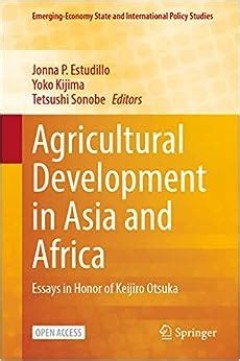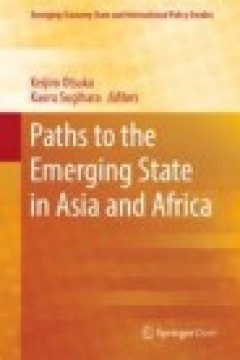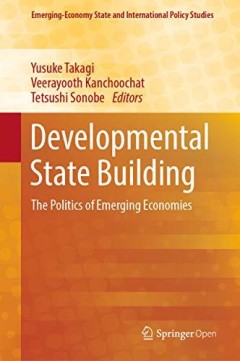Filter by

Data Collection in Fragile States : Innovations from Africa and Beyond
‘This open access book addresses an urgent issue on which little organized information exists. It reflects experience in Africa but is highly relevant to other fragile states as well.’ —Constantine Michalopoulos, John Hopkins University, USA and former Director of Economic Policy and Co-ordination at the World Bank Fragile countries face a triple data challenge. Up-to-date information…
- Edition
- 1
- ISBN/ISSN
- 9783030251208
- Collation
- XXXI, 243 hlm; ill., lamp.,
- Series Title
- -
- Call Number
- -

Financing Clean Energy Access in Sub-Saharan Africa : Risk Mitigation Strateg…
This open access book analyses barriers and challenges associated with the financing of clean energy access in sub-Saharan Africa. By considering various economic, financial, political, environmental and social factors, it explores the consequences of energy poverty across the region and maps the real and perceived investment risks for potential capital providers, both domestic and internationa…
- Edition
- -
- ISBN/ISSN
- 978-3-030-75829-5
- Collation
- XIII, 197
- Series Title
- SpringerBriefs in Energy (BRIEFSENERGY)
- Call Number
- 338 MIC f

Sustainable Development in the Jordan Valley : Final Report of the Regional N…
This book summarizes the NGO Master Plan that provides a comprehensive program to rehabilitate the Lower Jordan River and its tributaries in Jordan, Israel and Palestine. It is a regional and civil society effort designed to promote the restoration of the valley’s environmental and ecological values within a realistic financial and economic framework. The plan identifies 127 specific regional…
- Edition
- -
- ISBN/ISSN
- 978-3-319-30036-8
- Collation
- XLII, 239
- Series Title
- Hexagon Series on Human and Environmental Security and Peace (HSHES, volume 13)
- Call Number
- 338.1 KOO s

Internal Migration, Urbanization and Poverty in Asia: Dynamics and Interrelat…
This book is Open Access under a CC BY license. This volume offers an essential resource for economic policymakers as well as students of development economics focusing on the interrelationships of migration, urbanization and poverty in Asia. The continent’s recent demographic transitions and rural-urban structural transformations are extraordinary, and involve complexities that require …
- Edition
- 1
- ISBN/ISSN
- 9789811315374
- Collation
- XII, 367 hlm,: ill, lamp;
- Series Title
- -
- Call Number
- -

Agricultural Development in Asia and Africa: Essays in Honor of Keijiro Otsuka
This Open Access book explores the multifaceted nature of agricultural and rural development in Asia and examines the extent to which the Asian experience is being replicated in contemporary Africa. This volume compiles the works of top scholars who provided analyses and evidences from household-level surveys collected for many years in several parts of Asia and Africa. The most important findi…
- Edition
- 1
- ISBN/ISSN
- 9789811955426
- Collation
- XXXIII, 387hlm,: ill, lamp;
- Series Title
- -
- Call Number
- -

Emerging States and Economies: Their Origins, Drivers, and Challenges Ahead
This open access book asks why and how some of the developing countries have “emerged” under a set of similar global conditions, what led individual countries to choose the particular paths that led to their “emergence,” and what challenges confront them. If we are to understand the nature of major risks and uncertainties in the world, we must look squarely at the political and economic…
- Edition
- 1
- ISBN/ISSN
- 9789811326349
- Collation
- X, 177hlm,: ill, lamp;
- Series Title
- -
- Call Number
- -

Paths to the Emerging State in Asia and Africa
This book addresses the issue of how a country, which was incorporated into the world economy as a periphery, could make a transition to the emerging state, capable of undertaking the task of economic development and industrialization. It offers historical and contemporary case studies of transition, as well as the international background under which such a transition was successfully made (or…
- Edition
- 1
- ISBN/ISSN
- 9789811331312
- Collation
- XXI, 292 hlm,: ill, lamp;
- Series Title
- -
- Call Number
- -

Developmental State Building
This open access book modifies and revitalizes the concept of the ‘developmental state’ to understand the politics of emerging economy through nuanced analysis on the roles of human agency in the context of structural transformation. In other words, there is a revived interest in the ‘developmental state’ concept. The nature of the ‘emerging state’ is characterized by its attitude t…
- Edition
- -
- ISBN/ISSN
- 9789811329043
- Collation
- -
- Series Title
- -
- Call Number
- -

Transforming Food Systems for a Rising India
This open access book examines the interactions between India’s economic development, agricultural production, and nutrition through the lens of a “Food Systems Approach (FSA).” The Indian growth story is a paradoxical one. Despite economic progress over the past two decades, regional inequality, food insecurity and malnutrition problems persist. Simultaneously, recent trends in obesity …
- Edition
- 1
- ISBN/ISSN
- 978-3-030-14409-8
- Collation
- oer.unej.ac.id
- Series Title
- Palgrave Studies in Agricultural Economics and Food Policy
- Call Number
- 330

The Early Years
This book is open access under a CC BY-NC-ND 3.0 IGO license. The Early Years analyzes the development of Latin American and Caribbean children and makes a compelling case for government intervention in what is instinctively a family affair. Spending on effective programs for young children is an investment that, if done well, will have very high returns, while failure to implement such pro…
- Edition
- 1
- ISBN/ISSN
- 978-1-137-53649-5
- Collation
- -
- Series Title
- -
- Call Number
- XXII, 262
 Computer Science, Information & General Works
Computer Science, Information & General Works  Philosophy & Psychology
Philosophy & Psychology  Religion
Religion  Social Sciences
Social Sciences  Language
Language  Pure Science
Pure Science  Applied Sciences
Applied Sciences  Art & Recreation
Art & Recreation  Literature
Literature  History & Geography
History & Geography